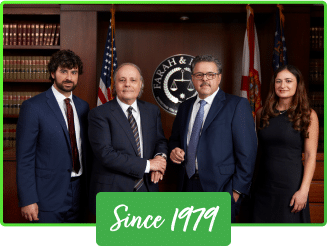Whistleblower Attorneys
When faced with the decision to expose illegal activities within an organization or workplace, it’s crucial to understand the potential risks involved. Individuals who report instances of wrongdoing in these cases are known as whistleblowers. These individuals play a fundamental role in promoting transparency and ethical conduct within organizations.

FREE CASE REVIEW
Home > Labor Law Attorneys > Whistleblower Attorneys
What Is Whistleblowing?
Whistleblowing is an act of courage and integrity where individuals expose wrongdoing within their organizations, such as uncovering financial fraud, revealing safety violations, or exposing other unethical practices. However, the decision to blow the whistle often comes with risks, such as the risk of facing retaliation from employers.
Why Contact a Whistleblower Attorney?
Retaliation can take many forms, including termination of employment, harassment, unfair treatment, reduction in salary, or other adverse actions. At Farah & Farah, we understand the challenges whistleblowers face and the importance of their role in upholding justice. Our team of experienced labor law attorneys, which includes T’Keara Watson and Allison Brieter, is dedicated to providing whistleblowers with the support and legal guidance they need to navigate the complexities of their cases and protect their rights.
If You Are Facing Retaliation for Whistleblowing Farah & Farah Can Support You
Whistleblowers are vital to our society, and that is why it’s important to recognize their contributions and support them in their efforts to uphold integrity and fairness. If you happen to be someone who wants to blow the whistle, you can trust in Farah & Farah’s guidance and knowledge to navigate your case successfully. With Farah & Farah’s support, whistleblowers can protect their rights, navigate potential challenges, and achieve justice for themselves and the public interest.
Farah & Farah’s Whistleblower Attorneys
Our attorneys at Farah & Farah can provide whistleblowers with the support they need. Committed to our clients’ welfare, our attorneys are dedicated to assisting whistleblowers through every step of the process, ensuring that their rights are protected and their concerns are addressed with diligence and care. With our firm’s extensive experience and unwavering dedication, whistleblowers can trust in our guidance and advocacy to navigate the complexities of their cases with confidence and assurance.
What Can a Whistleblower Attorney Do for You?
Whistleblower attorneys play a crucial role in supporting individuals who decide to expose wrongdoing within their organizations. From conducting a thorough investigation to preparing strong legal arguments, whistleblower attorneys can help individuals effectively assess their situations and present their cases for success. Whistleblower attorneys also protect individuals from potential retaliation from their employers, ensuring the confidentiality and protection of their disclosures. Having a reliable whistleblower attorney is essential to safeguarding whistleblowers’ rights and achieving justice.
Why Should You Consult a Whistleblower Attorney at Farah & Farah?
Reporting workplace misconduct, such as fraud, discrimination, safety violations, harassment, corruption, or other unethical practices, can potentially lead to illegal retaliation from employers. That’s why it’s crucial to select a reputable law firm with experienced whistleblower attorneys who can effectively represent your interests. At Farah & Farah, our firm’s commitment and deep understanding of the law ensures that your case is presented with credibility and integrity. Trust Farah & Farah to be your allies in seeking justice and accountability in the workplace.
What Is a Whistleblower?
A whistleblower is an individual, often an employee or member of an organization, who reports instances of illegal, unethical, or immoral activities occurring within their company or organization. These reported activities may encompass a range of wrongdoing, such as law violations, corruption, fraud, abuse, or threats to public health and safety. When disclosing such misconduct, whistleblowers can report it to a government or law enforcement agency, a superior within the organization, or another employee holding a position of authority. Whistleblowers usually operate within the organization where the wrongdoing occurs, but they may also work within other areas of the organization.
Internal vs. External Whistleblowers
The distinction between internal and external whistleblowers lies in whether they disclose information solely within their organization or also involve external entities. Internal whistleblowers communicate their concerns within the organizational hierarchy, while external whistleblowers may engage with government officials, law enforcement, or media outlets to expose wrongdoing. The decision to report identified misconduct may entail personal and professional risks, but it serves to uphold integrity, accountability, and transparency within the affected institution or society at large.
The Importance of Whistleblowers
Each year, numerous individuals come forward to expose various forms of wrongdoing, ranging from bad accounting to tax fraud to pollution to illegal wildlife trade. These acts of whistleblowing play a crucial role in safeguarding the interests of the government, company shareholders, and taxpayers. Reporting inappropriate or illegal activities helps ensure accountability and integrity in both public and private sectors. Whistleblowers are essential to the detection and prevention of fraud and other wrongdoing by disclosing information that would otherwise remain unknown.
Why Do Whistleblowers Need Legal Representation?
With the right legal representation, whistleblowers can not only protect themselves from negative consequences but also stand a chance to receive financial rewards for aiding in the prosecution of wrongdoers. Therefore, it is advisable, as recommended by the National Whistleblower Center, for prospective whistleblowers to seek legal counsel before taking any steps to report misconduct.
What Are Some Examples of Whistleblowers?
Whistleblowers are present in a multitude of professions and industries, ranging from healthcare facilities to financial institutions and more. The following examples illustrate just a few scenarios in which whistleblowing can occur.
- A hospital nurse who exposes cases of patient mistreatment or negligence
- An accountant who reports fraudulent financial activities within their company
- An engineer who raises safety concerns regarding manufacturing practices
- A government employee who reveals corruption or misuse of public funds
- A financial analyst who uncovers insider trading or securities fraud
- An environmental scientist who brings attention to illegal pollution practices
- A social worker who speaks out against misconduct within the foster care system
- An IT specialist who discovers cybersecurity breaches or data privacy violations
- A sales representative who reports unethical sales tactics
- A teacher who exposes unethical behavior among school administrators
Laws That Offer Protection and Financial Rewards for Whistleblowers
There are several laws across federal, state, and local jurisdictions aimed to encourage individuals to blow the whistle. The United States has played a pivotal role in establishing whistleblower legislation, offering protection and financial incentives for individuals who report evidence of wrongdoing. Some examples of these laws are:
- The False Claims Act of 1863
- The IRS Whistleblower Law of 2006
- The Dodd-Frank Act of 2010
The False Claims Act of 1863
The False Claims Act of 1863 is America’s first whistleblower law and one of the strongest whistleblower laws in the United States. Individuals who report fraud in government contracting or other government programs are entitled to receive between 15 and 30 percent of any funds recovered by the government as a result of their assistance in prosecuting the fraudulent activity.
Qui Tam (Whistleblower) Provision
The Qui Tam Provision, also known as the whistleblower provision, is a significant aspect of the law. It allows anyone or any private entity to initiate a legal action in the U.S. District Courts on behalf of the United States. Through this provision, individuals who expose fraud resulting in financial loss to the government may be eligible for rewards while maintaining their anonymity.
The IRS Whistleblower Law of 2006
The IRS Whistleblower Law of 2006 ensures that individuals who help expose tax fraud are rewarded with payments ranging from 15 to 30 percent of the monetary sanctions collected by the government as a result of their assistance.
The Dodd-Frank Act of 2010
The Dodd-Frank Act of 2010 provides financial rewards to whistleblowers who expose securities and commodities fraud, offering them payments ranging from 10 to 30 percent of the funds collected by the government as penalties.
The Importance of Adhering to a Correct Reporting Process
When reporting instances of illegal, unethical, or immoral activities, adhering to a correct reporting process is crucial for a fair evaluation of the claims and for obtaining protection against retaliation and potential rewards. Therefore, it’s strongly recommended to rely on the expertise of a skilled whistleblower attorney to ensure that your rights are secured throughout the process. At Farah & Farah, our team of experienced attorneys is dedicated to providing the guidance and support needed to navigate through these complex legal matters effectively.
$2+ BILLION IN RESULTS

Can Whistleblowers Remain Anonymous?
Legal proceedings initiated under the False Claims Act are filed under seal. This means that whistleblower cases are handled with absolute confidentiality throughout the entire investigative process. Any related information to the case is kept confidential while government authorities investigate.
When Could a Whistleblower Lose Anonymity?
Despite efforts to maintain confidentiality, there are instances where whistleblowers can potentially lose their anonymity. For example, if the case goes to trial or if the accused individuals are able to identify the whistleblower, anonymity may be compromised. Additionally, in some cases, the court may order the disclosure of the whistleblower’s identity if it’s deemed necessary for the proceedings. Therefore, while whistleblower programs strive to protect the anonymity of individuals, there is always a risk of exposure under certain circumstances.
Why Is it Important To Preserve Whistleblower Anonymity?
Preserving the anonymity of a whistleblower is crucial in protecting them from potential retaliation for their disclosures. Whistleblower attorneys help file complaints securely and handle case documents confidentially to prevent leaks. They protect whistleblower identities, ensure legal compliance, and serve as intermediaries with regulatory bodies and law enforcement, reducing direct exposure. At Farah & Farah, our specialized attorneys understand the importance of anonymity in whistleblower cases. We can help ensure that your identity remains confidential throughout the process, providing you with the safety you need to speak out against wrongdoing.
What Laws Protect Whistleblowers in Florida?
The state of Florida has enacted specific laws in order to protect individuals who report fraud or misconduct occurring within a workplace or an organization. These laws aim to encourage individuals to blow the whistle without fear of retaliation and to help maintain integrity and accountability in various sectors.
The Florida Whistleblower’s Act of 1986
The Florida Whistleblower’s Act of 1986 protects public employees from employer retaliation when they disclose and report information involving illegal actions taken within the organization that endanger public health and safety. Protections and compensations are provided to individuals facing repercussions for exposing fraudulent actions, such as reinstatement of employment, compensation for damages, and coverage of legal fees.
The Florida False Claims Act of 1994
The Florida False Claims Act of 1994 (FFCA) allows whistleblowers in Florida to file lawsuits, known as qui tam actions, on behalf of the state in cases where fraud involving public funds is suspected. The FFCA encourages whistleblowers to report fraud or wrongdoing without fear of retaliation from their employers. This law also allows individuals to keep their identity confidential unless it’s necessary for the investigation. Whistleblowers who file successful cases under the FFCA may be eligible for rewards. The rewards typically consist of a percentage of the amount recovered from the fraudulent activity, ranging from 15 to 30 percent of the recovered amount.
What Laws Protect Whistleblowers in Georgia?
Whistleblowers in Georgia benefit from protections under both federal and state laws. Federal laws establish a baseline for protecting individuals who disclose wrongdoing, but the state of Georgia has additional protections for whistleblowers. These state-specific laws not only complement federal statutes but also address unique aspects of whistleblower cases within Georgia, offering protections and support for those who come forward.
The Georgia False Claims Act of 2007
The Georgia False Claims Act of 2007 (GFCA) prohibits individuals and organizations from presenting fraudulent claims to the state. Just like the federal False Claims Act (FCA), the GFCA also allows whistleblowers to file lawsuits on behalf of the state, known as “qui tam” actions when exposing fraud involving state funds or programs. The GFCA includes provisions for rewarding individuals who file successful cases, with rewards ranging from 15 to 30 percent of the amount recovered. The GFCA prohibits employers from retaliating against whistleblowers. However, individuals who face retaliation are entitled to compensation for any damages, such as reinstatement of their job and back pay.
Attorney General Approval for False Claims Act Cases
The Georgia False Claims Act is essential for exposing fraud and recovering funds on behalf of the state of Georgia while also providing incentives and protections for whistleblowers who have the courage to come forward. However, before a qui tam action can move forward, it must receive approval from the Georgia Attorney General. This requirement could lead to fewer cases being filled. Our experienced attorneys at Farah & Farah have the knowledge and skills to help you navigate this process efficiently and effectively, ensuring your case moves forward successfully. You can trust our dedicated team to advocate for your rights and achieve the best results for your case.
The Georgia Whistleblowers Act of 1989
The Georgia Whistleblowers Act of 1989 protects employees from retaliation by their employers when they report violations of laws, rules, or regulations within their organizations. Employees who face retaliation may be entitled to various remedies, including reinstatement of employment, compensation for lost wages, and coverage of legal fees. By providing legal protections, the Georgia Whistleblowers Act encourages individuals to speak up against misconduct.
for the family of a motorcycle rider killed by a driver who ran a red light
for a passenger injured when a truck struck a motorcycle
in the wrongful death of a wife who died in a motorcycle collision with a dump truck
for a rider who suffered a severe leg injury when struck by a car
for a rider injured when a careless driver pulled out in front of the motorcycle
What To Do if You Are Considering Blowing the Whistle
If you find yourself in a situation where you want to blow the whistle or are concerned about retaliation from whistleblowing, you can trust Farah & Farah’s knowledge and guidance to navigate your case confidently. Our whistleblower lawyers, including Alison Breiter and T’Keara Watson, are here to help you every step of the way, ensuring that your voice is heard and your rights are protected. At Farah & Farah, we understand the importance of your role in upholding integrity and accountability, and we are dedicated to giving you the support you need.

Contact Farah & Farah’s experienced whistleblower attorneys today for a free consultation if you’re in Florida or Georgia. We are dedicated to securing the justice and compensation you deserve. You won’t have to pay a dime unless your case is successful.
Civil Rights Discrimination Attorneys
Workplace Discrimination Attorneys
Workplace Retaliation Attorneys














FREE CASE REVIEW
